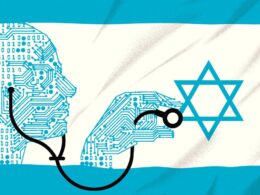the health strategist
institute for strategic health transformation
& digital technology
Joaquim Cardoso MSc.
Chief Research and Strategy Officer (CRSO),
Chief Editor and Senior Advisor
September 26, 2023
One page summary
What is the message?
Google is committing to advancing the United Nations Sustainable Development Goals by funding 15 AI-powered projects, with a focus on digital health initiatives aimed at improving healthcare access and provider experiences.
Each project receives $3 million in cash support, technical assistance, and Google Cloud credits.
This funding will drive innovations in healthcare, particularly in resource-constrained regions.

Key Takeaways:
1. Google’s Commitment
Google is funding 15 AI projects to support the United Nations Sustainable Development Goals. Eight of these projects are focused on digital health, aiming to address critical healthcare challenges.
2. Digital Health Initiatives
Among the funded projects, several digital health initiatives stand out, including:
- RAD-AID: Providing AI-enabled tools to triage patients and interpret X-rays and scans, with a focus on respiratory diseases and breast cancer.
- Wuqu’ Kawoq and safe+natal: Developing a machine learning tool kit to aid midwives in detecting neonatal complications in rural Guatemala.
- MATCH (Music Attuned Technology – Care via eHealth): Combining music and wearable sensor technology to reduce agitation in dementia patients.
- Makerere AI Lab: Creating a 3D-printed adapter for AI image processing to aid in diagnosing diseases in low-resource settings.
- IDinsight with Reach Digital Health: Offering a natural language-enabled question-answering service for expectant mothers in South Africa.
- Causal Foundry: Developing a smartphone-based tool to assist community health providers in Sub-Saharan Africa.
- Jacaranda Health: Delivering an SMS-based digital health platform for expectant mothers in Sub-Saharan Africa.
- The University of Surrey and Signapse: Using generative AI to provide real-time translation and sign language videos for deaf individuals in the U.S. and U.K.
3. Google’s Med-PaLM 2
Google’s machine learning technology, Med-PaLM 2, aims to improve healthcare information access by answering medical questions. It has shown high accuracy levels in medical testing scenarios and is available for select Google Cloud customers.
4. Claims Acceleration Suite
Google introduced an AI-enabled Claims Acceleration Suite to streamline prior authorization and claims processing in health insurance, converting unstructured data into structured data.
5. Research Findings
A study by Google researchers found that Med-PaLM provided long-form answers aligned with scientific consensus, closely matching clinician-generated answers.
In conclusion:
Google’s funding of AI-enabled digital health projects reflects its commitment to improving healthcare accessibility and quality, especially in underserved regions.
These initiatives have the potential to revolutionize healthcare and address critical medical challenges worldwide.
DEEP DIVE

This summary was written based on the article “Google announces funding for AI-enabled digital health projects”, published by Time and written by Jessica Hagen, on September 13, 2023.
To read the full article, access https://www.mobihealthnews.com/news/google-announces-funding-ai-enabled-digital-health-projects











